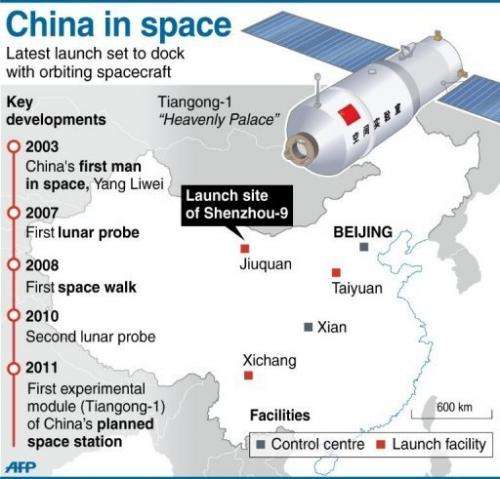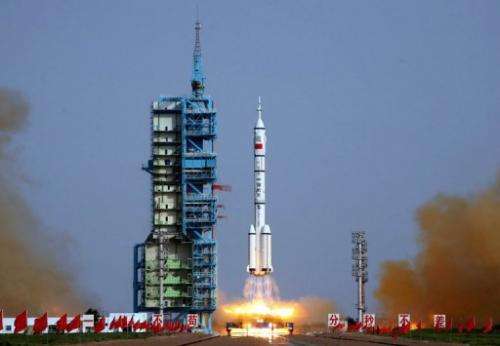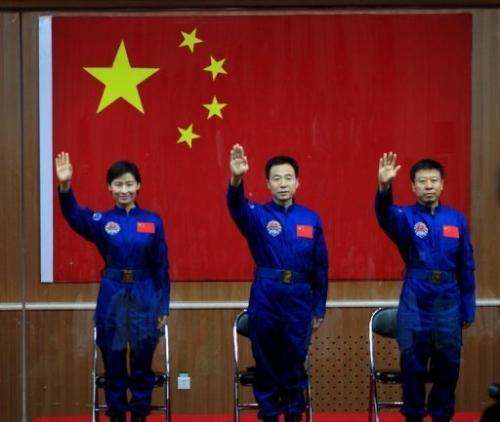Chinese ground staff cheer as the astronauts make their way to board the Shenzhou-9 spacecraft -- China's fourth manned space mission -- which blasted off from the Jiuquan space base, northwest China's Gansu province in the remote Gobi desert, on June 16.
China's latest space mission is its most ambitious yet and shows Beijing's resolve to increase its technological capabilities and bridge the gap with the United States and Russia, experts say.
The Shenzhou-9 rocket blasted off from the Gobi desert on Saturday with three astronauts on board -- including, for the first time, a woman -- to conduct China's first manned space docking, the latest step towards setting up a space station.
The mission marks a huge stride forward for China, which in 1999 kicked off its manned space programme with the launch of Shenzhou-1 ("Divine Vessel" in Chinese) with no crew on board.
Two years later, Shenzhou-2 lifted off with small animals aboard, and in 2003, China sent its first man into space. Since then, it has completed a space walk in 2008 and an unmanned docking between a module and rocket last year.
But the latest mission is even more technically demanding, as astronauts will have to control the space docking manually.
Graphic on key developments in China's space program. China launched its most ambitious space mission to date, sending its first female astronaut to the final frontier and bidding to achieve the country's first manual space docking.
The procedure will put the spacecraft's manual control system to the test and demands huge operational accuracy from the astronauts, Wu Ping, spokeswoman for China's manned space programme, told reporters.
"This is China's most ambitious space mission so far. It is longer and more complex than anything previously done," said Morris Jones, an Australian space expert.
"It shows that China is serious about its long-term goals in space."
Successful completion of the docking -- a highly technical procedure that requires two vessels to gently come together in high speed orbit -- will take China one step closer to building its own space station in 2020.
The mission has also taken on a symbolic dimension as Shenzhou-9 is carrying Liu Yang, China's first ever female astronaut to go to space.
The Asian powerhouse has even bigger ambitions of sending astronauts to the moon, although nothing has yet been set in stone.
The Shenzhou-9 -- China's fourth manned space mission -- blasts off from the Jiuquan space base, northwest China's Gansu province in the remote Gobi desert. China launched its most ambitious space mission to date, sending its first female astronaut into orbit and bidding to achieve the country's first manual space docking.
Nevertheless, China -- which in the 1980s was focused solely on developing satellites -- continues to play catch-up with Russia and the United States.
"It will still take at least another decade before China reaches a comparable level to Russia or the USA in space flight," said Jones.
Just like it did for its first manned space flight, China is having to master key manoeuvres and tasks that the Americans and Russians successfully completed way back in the 1960s, as it races towards creating a space station.
Professor Rene Oosterlinck from the European Space Agency said "manned flights are firstly a matter of prestige and a nod to Chinese citizens."
"It's obvious that China, which is absent from the International Space Station, wants to demonstrate that it is capable of independently doing something similar," he told AFP.
"The fact that a woman is present this time round is also symbolic as it demonstrates that the Chinese space infrastructure allows for mixed crews, which in a way is more complex as, for instance, you need toilets adapted for both sexes."
Chinese first woman astronaut Liu Yang together with her two male colleagues, Jing Haipeng (centre) and Liu Wang wave as they are introduced during a press conference at the Jiuquan space base in Gansu province. China launched its most ambitious space mission to date, sending its first female astronaut to the final frontier and bidding to achieve the country's first manual space docking.
But he added that from a strategic point of view, satellites are much more important for China.
As it pushes to become a global space power, experts say China's ambitions go well beyond a space station, or even a moon landing, to satellite observation and a global positioning system to rival that of the United States.
By 2016, China will "increase the use of satellites to contribute to the development of strategic industries and satisfy the needs of the economy" in telecommunications, earth observation or global positioning systems, said a white paper released late last year.
In 2011, China launched its version of the US Global Positioning System (GPS), the Beidou satellite navigation system. Further satellites will enable the new system to cover Asia this year, and the whole world by 2020.
Beijing has long maintained that the rapid development of its space capabilities is peaceful in nature, and the white paper reiterated this, saying Beijing "opposes weaponisation or any arms race in outer space."
But concerns remain over China's intentions.
In 2009, air force commander General Xu Qiliang caused a stir when he said armed forces should prepare for the "inevitable" militarisation of outer space -- a claim hastily disavowed by President Hu Jintao.
(c) 2012 AFP


























